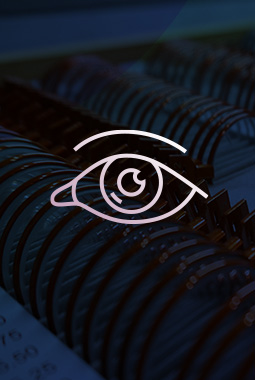Convenient Vision Correction
If you’ve ever worn glasses or contact lenses, you’ve probably thought about what life might be like if you didn’t have to. Imagine the ease of waking up in the morning and not having to wear glasses just to see your alarm clock.
We can help you navigate the different types of laser eye surgery available and determine whether you are a good candidate for the procedure. After a comprehensive eye exam, we will help you understand your options and which style of laser vision correction might best suit your situation.
Start your laser eye surgery journey by booking a consultation today!
Book Appointment OnlineWhat Happens in a Laser Eye Surgery Consultation?
Everyone considering laser eye surgery needs to have a comprehensive eye exam and consultation. We’ll take a detailed look at your eyes and discuss your health history and lifestyle needs.
We’ll also be sure to discuss your expectations for the surgery. Many people achieve 20/20 vision after their procedure, but some need glasses or contact lenses post-surgery. But, surgery almost always decreases reliance on corrective lenses.
Who Can Benefit from Laser Eye Surgery?
To be considered a candidate for laser eye surgery, your eyes must be in good health. Infections, severe dry eye, or recent trauma may mean you’ll need to delay the procedure.
Here are a few other considerations for surgery:
- You must be 18 years of age or older.
- Your refractive error must not be too great.
- Your prescription must be stable.
To find out whether you’re a candidate for laser vision correction, book an appointment today!
LASIK
Laser-assisted in situ keratomileusis (LASIK) involves a surgeon cutting a flap in your cornea. This flap is then folded back, and the remaining layers are reshaped with a precision laser.
Once the reshaping is complete, the surgeon will return the flap to its original position, and the cornea will repair itself. Post-surgery surveys report extremely high levels of satisfaction with LASIK.
PRK
Photorefractive keratectomy (PRK) involves the surgeon removing the top layer of the cornea altogether, then reshaping the remaining layers.
What Is Laser Eye Surgery?
Laser eye surgery is a group of procedures—all just a little bit different—that use a laser to correct refractive errors in your vision.
Technological advances have made several types of laser vision correction possible, but the 2 most common types remain LASIK and PRK.
Book Appointment OnlineOur Location
Visit Us
Find us on the corner of Main Street and Beaver Lake Road. We are accepting new patients and looking forward to welcoming you and your family.
Our Address
- 49-9522 Main Street
- Lake Country, BC V4V 2L9
Contact Information
- Phone: 250-766-4240
- Fax: 250-766-4267
- Email: [email protected]
Our Hours
- Monday: 9:00 AM – 5:00 PM
- Tuesday: 9:00 AM – 5:00 PM
- Wednesday: 8:00 AM – 7:00 PM
- Thursday: 9:00 AM – 5:00 PM
- Friday: 9:00 AM – 5:00 PM
- Saturday: 9:00 AM – 3:00 PM
- Sunday: Closed
Our Brands





Frequently Asked Questions
Can you make glasses with an external prescription?
Yes, we accept all prescriptions for glasses that have not expired. If your prescription is expired or you need to have your prescription assessed, we are more than happy to book you an appointment with one of our doctors for an exam.
How long does it take for glasses to arrive?
We make glasses in-house, and it takes around 3 hours for us to edge the lenses into your frame of choice. If glasses need to be ordered in, they typically take around 7 to 10 business days. Specialty orders may take longer to arrive. Our optical will do our best to give you an accurate time estimate and have your glasses made as soon as we can.
What is included in a full eye exam?
A full eye exam includes the following:
-
- A comprehensive ocular and medical history check-up to identify or assess your risk factors for certain eye diseases
-
- A vision check and prescription for glasses, if warranted
-
- Binocular vision testing to check how your eyes are functioning together
-
- A measurement of intraocular pressure (IOP) on all patients
-
- An optomap scan of your retina on all patients
-
- An OCT (optical coherence tomography) scan for adults
-
- A comprehensive eye health check in the office by the doctor
-
- If warranted, your eye doctor may recommend a visual field test to better assess peripheral vision in association with the use of medications with risk of harmful effects on vision
What is the cost of an eye exam?
Children (18 and under), seniors (65+), or those with certain medical conditions are eligible for medical services plan (MSP) coverage. MSP covers part of the eye exam and visual field tests (think of it like insurance), lowering the total cost of the exam you/your insurance is responsible for. We do not charge for children age 2 and under.
A patient is NOT eligible for MSP coverage if:
- You are from out of province
- Not registered with BC medical
- If you have had an eye exam elsewhere within the past year
| Service | Full Cost | If MSP Billable |
| Adult Eye Exam (19+) | $162 | $115 |
| Adult Contact Lens Wearer Eye Exam (19+) | $177 | $130 |
| Child Eye Exam (2-18) | $85 | $30 |
| Child Contact Lens Wearer Eye Exam (2-18) | $100 | $45 |
Do you do LASIK co-management?
Yes, we are more than happy to be a part of your LASIK journey. We are pleased to offer post-op follow-ups.
Can you direct bill my insurance?
Yes, we can directly bill most insurance companies. If your insurance company is not eligible for direct billing, we will provide you with a detailed receipt to submit for reimbursement.
What do I need to bring to my eye exam?
Please bring a list of medications, your glasses and contact lenses (or your last prescription), and any forms that need to be completed.
How long is an eye exam?
Full eye exams are usually between 30 to 45 minutes.
Do I have to be dilated during the exam?
Our office offers wide-field retinal imaging with the optomap machine on all patients who are physically able to. The optomap scan provides a 200-degree image of the retina (inside lining of the eye).
In certain cases, dilation is still recommended to better assess the retina and check for cataracts and other ocular diseases. If you are dilated, we encourage bringing a driver with you so you feel more safe on the way home.






